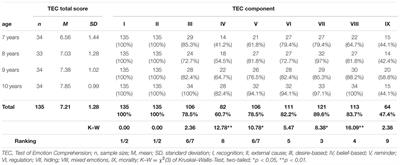EDITORIAL
Published on 13 Jul 2017
Editorial: Mental State Understanding: Individual Differences in Typical and Atypical Development
doi 10.3389/fpsyg.2017.01183
- 5,094 views
32k
Total downloads
237k
Total views and downloads
EDITORIAL
Published on 13 Jul 2017
PERSPECTIVE
Published on 29 May 2017
ORIGINAL RESEARCH
Published on 06 Feb 2017

ORIGINAL RESEARCH
Published on 30 Jan 2017

ORIGINAL RESEARCH
Published on 04 Jan 2017

ORIGINAL RESEARCH
Published on 22 Dec 2016

ORIGINAL RESEARCH
Published on 21 Dec 2016

ORIGINAL RESEARCH
Published on 06 Dec 2016

ORIGINAL RESEARCH
Published on 06 Dec 2016

METHODS
Published on 02 Dec 2016

ORIGINAL RESEARCH
Published on 14 Nov 2016

MINI REVIEW
Published on 04 Nov 2016
